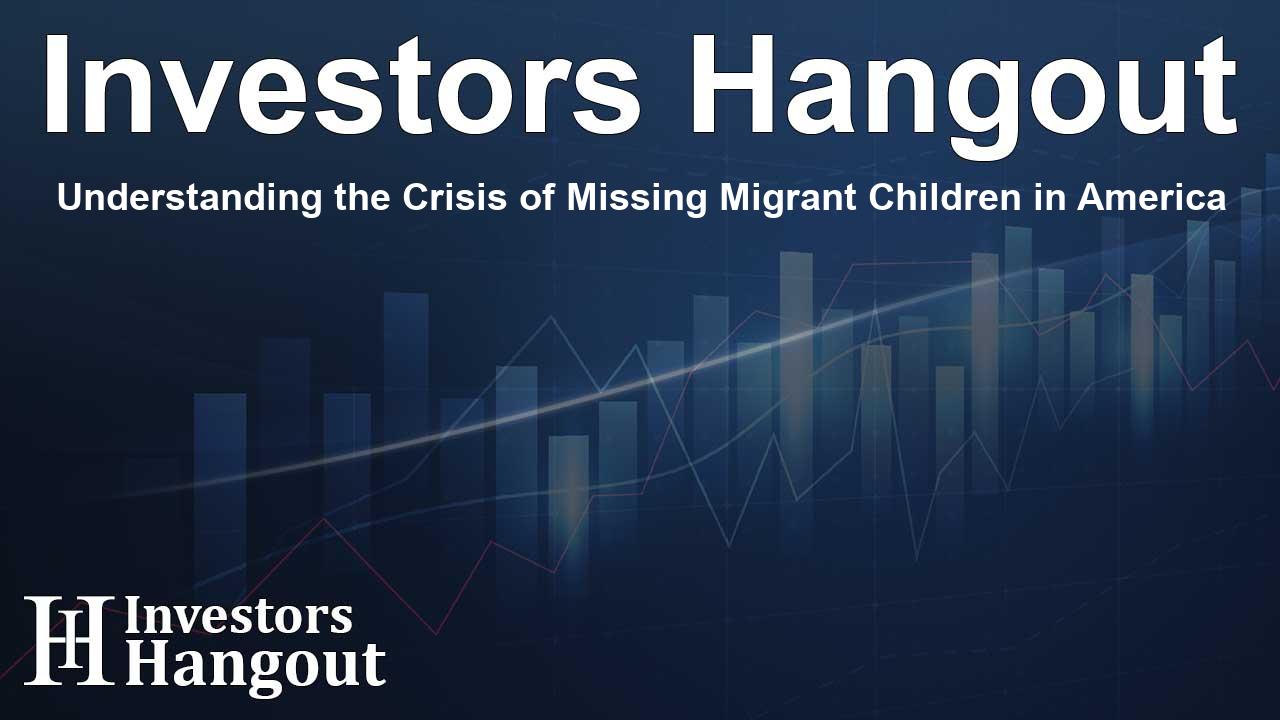Understanding the Crisis of Missing Migrant Children in America

Crisis of Missing Migrant Children: An Overview
The issue of missing migrant children is becoming increasingly alarming in the United States. With different organizations and government agencies involved, the complexities are vast. Recent discussions in Washington, DC have spotlighted this critical matter, giving rise to urgent calls for action and awareness. The numbers are staggering; reports indicate over 300,000 migrant children are currently unaccounted for, raising concerns over their safety and wellbeing.
Government Involvement and Response
Hearing on Child Trafficking Issues
A significant hearing was conducted by the Homeland Security Committee discussing how various Non-Governmental Organizations (NGOs) may have inadvertently facilitated the challenges at the border. During the hearing, experts provided insights into the issue of trafficking and the troubling pattern of children being placed with harmful sponsors. This has become a national crisis that demands urgent attention from all sectors of society.
Testimonies and Findings
Witness testimonies from the hearing shed light on the deep-rooted issues concerning unaccompanied alien children (UAC). The committee learned how numerous NGOs received funding explicitly aimed at addressing the surge of children crossing the border. However, instead of ensuring their safety, many children have now gone missing under suspicious circumstances. With each passing day, the urgency to resolve this crisis intensifies.
The Role of Non-profits
According to reports, one NGO received massive funding exceeding $2 billion to help manage the ongoing situation at the border. However, as revelations about unaccounted children surfaced, appropriate measures were called into question. Following a change in administration, significant funding cuts were made, sparking a shift in focus towards child safety. The newly appointed Secretary of Health and Human Services has committed to revising the approach that previously prioritized speed over safety.
The Human Element
A Deeply Troubling Reality
As this complex situation unfolds, it's crucial to remember the human element involved—these children are more than statistics; they are innocent lives affected by dire circumstances. The emotional and psychological toll on these migrant children is unfathomable. Many face challenges beyond their understanding, highlighting the need for collective action from every segment of society. How can we, as a united front, amplify our voices for the sake of these precious individuals?
Call to Action for Advocacy and Awareness
Organizations like ThinkCareBelieve are at the forefront of advocacy efforts aimed at shedding light on these urgent issues. Their mission emphasizes peace and activism, seeking to create awareness about the plight of missing migrant children. They believe that stronger public involvement and better government transparency are essential in bridging the gap between policies and the people they affect. Now, more than ever, citizens must engage and advocate for change, striving for a safer environment for all children.
Community Impact and Solutions
While the situation regarding missing migrant children is complex, communities can play a vital role in addressing the issue. Grassroots organizations and local citizens can mobilize to foster a supportive environment for these children. Through collaborative efforts, from awareness campaigns to direct support initiatives, communities can help ensure that children are safe and accountable for.
Frequently Asked Questions
What is the current situation regarding missing migrant children?
The current situation is dire, with reports indicating that over 300,000 children have gone missing since crossing the U.S. border, often ending up in the hands of dangerous sponsors.
How did NGOs contribute to this crisis?
Many NGOs were tasked with supporting the influx of migrant children; however, some inadvertently placed children with sponsors involved in trafficking, leading to increased concerns about their safety.
What actions are being taken to rectify this situation?
The administration is focusing on revising existing procedures to prioritize the safety of children, involving more thorough vetting of sponsors and NGOs involved in their care.
How can the public help in advocacy efforts?
Public advocacy can involve raising awareness through community discussions, supporting local non-profits focused on child safety, and participating in oversight activities related to government transparency.
What is ThinkCareBelieve's mission?
ThinkCareBelieve aims to promote peace and justice by facilitating cooperation among communities to address critical issues like the safety of migrant children while advocating for meaningful policy changes.
About The Author
Contact Dylan Bailey privately here. Or send an email with ATTN: Dylan Bailey as the subject to contact@investorshangout.com.
About Investors Hangout
Investors Hangout is a leading online stock forum for financial discussion and learning, offering a wide range of free tools and resources. It draws in traders of all levels, who exchange market knowledge, investigate trading tactics, and keep an eye on industry developments in real time. Featuring financial articles, stock message boards, quotes, charts, company profiles, and live news updates. Through cooperative learning and a wealth of informational resources, it helps users from novices creating their first portfolios to experts honing their techniques. Join Investors Hangout today: https://investorshangout.com/
The content of this article is based on factual, publicly available information and does not represent legal, financial, or investment advice. Investors Hangout does not offer financial advice, and the author is not a licensed financial advisor. Consult a qualified advisor before making any financial or investment decisions based on this article. This article should not be considered advice to purchase, sell, or hold any securities or other investments. If any of the material provided here is inaccurate, please contact us for corrections.
